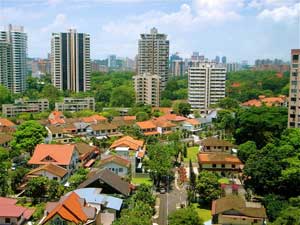 Airbnb has offered to work with Singapore's government to address concern of the impact of short-term rental service on private housing and the hotel industry in Singapore.
Airbnb has offered to work with Singapore's government to address concern of the impact of short-term rental service on private housing and the hotel industry in Singapore.
The company has offered to consider putting a cap on the number of days that hosts in Singapore can rent their property and implementing a registration system for them. Airbnb said it has told Singapore’s government that, if asked, the company would not list public housing on the platform, according to media reports.
“We feel optimistic that as the government looks around and sees the 400 plus partnerships that have been done, that if we can figure this out in Cuba, we should be able to figure it out here in Singapore,” Airbnb’s head of global policy Chris Lehane was quoted as saying by Reuters.
Shortly after the Singapore government announced that it would seek public feedback on the regulatory framework to be prepared for short-term rentals, Airbnb termed the government’s move to impose measures as “untenable” and said that the company was willing to collaborate with the government to make the system of short-term rental service work in Singapore.
Current regulations say that private homes including apartments in Singapore should be rented out for at a minimum stay of three consecutive months. They cannot be let to transient occupants i.e. travelers. Those wanting to stay for less than three months should stay in hotels or serviced apartments, according to the URA.
The short-term rental service company said that the regulatory framework was not in line with how Singaporeans like to travel and use their home today.
“Nearly three years since the URA’s first public consultation, it’s disappointing that the discussion has not moved forward,” the company said in a statement, referring to the Urban Redevelopment Authority.
The company’s statement came in the wake of the Singapore government’s announcement to seek public feedback on the regulatory framework.
The Singapore government had last year charged two men with unauthorized Airbnb short-term letting of four apartments - a first-of-kind case.
The Urban Redevelopment Authority (URA) has investigated nearly 1,735 cases of unauthorized short-term letting of private homes from 2015 to November 2017. However almost all owners were let off after promising to comply with the regulations.
The two men - Terence Tan En Wei, 35, and Yao Song Liang, 34 - recently pleaded guilty in court to four charges of illegally renting out four flats in a luxury private block in central Singapore. According to the documents submitted to the court, the two men rented out four units in a condominium for less than six months without permission from the URA. Each will be liable to a fine of up to S$80,000 (US$60,700) per offence. They will be sentenced in April.
Many countries around the world are taking steps to minimize the impact of short-term rental service on private housing and the hotel industry.
The URA is now planning to seek feedback from “representatives of home-sharing platforms, resident groups and other accommodation providers to ensure that the framework is robust and addresses the concerns of all parties, including residents and industry stakeholders,” news agency Reuters quoted a URA statement.